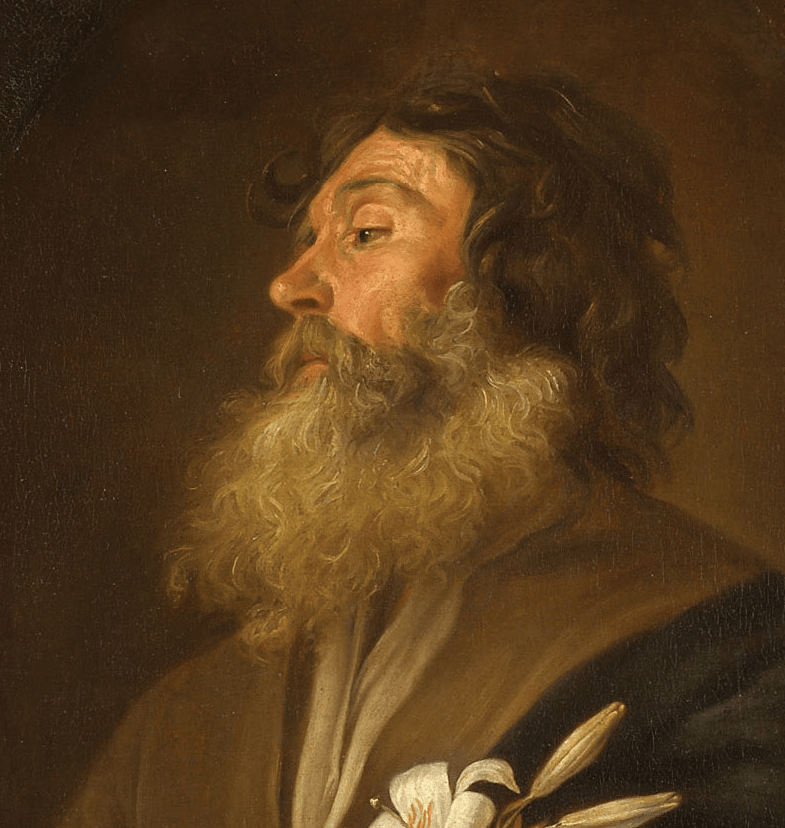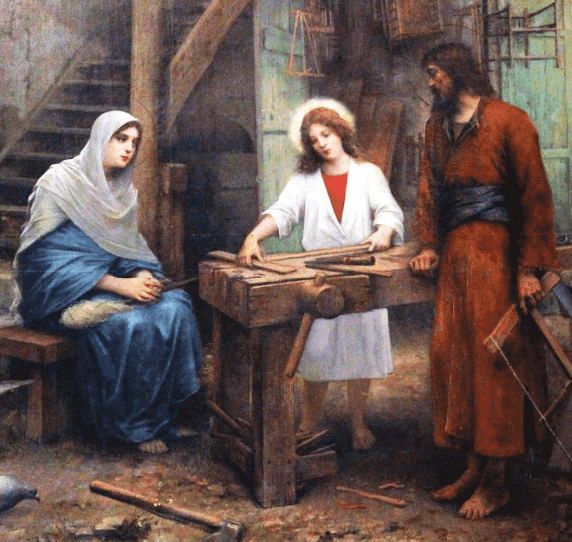“WITH A FATHER’S HEART: that is how Joseph loved Jesus.”[1] This is how Pope Francis opened his Apostolic Letter, “Patris Corde,” which was issued to mark the 150th anniversary of the proclamation of St. Joseph as ‘Patron of the Universal Church.’ It was on December 8, 1870, when Pope Pius IX made the declaration. To mark the occasion, Pope Francis saw it fit to dedicate a year to St. Joseph from Dec. 8, 2020 to Dec. 8, 2021, to “increase our love for this great saint, to encourage us to implore his intercession, and to imitate his virtues and his zeal.”[2]
Those who follow in the way of Mary can also certainly find an example in St. Joseph. After all, by virtue of their marriage bond,[3] the two have become one, so you can’t take one without the other. Thus, for those who belong to the Work of Mary, this year can be a year to look deeper into the spirituality of unity, which is not only known for its Marian character, but also possesses certain “Josephian” dimensions that have yet to be discovered.
Choosing God-Love as the Ideal and Obeying His Will

Joseph would certainly not have accepted his role in the history of salvation if he had not chosen God as the Ideal of his life. Even if the angel appeared to him in his sleep and told him about the plan of God for humanity, if he did not have faith in God and if he did not make Him the center of his life, he would have easily set aside the angel’s reminder and set off on his own. We know that when Joseph woke up from the dream, he chose to believe and follow what God’s messenger told him. Just as Mary experienced, Joseph also had his own ‘Annunciation’ moment, and when he woke up, his actions were a clear indication of his ‘yes’ to God. It was not the only time that we saw Joseph’s obedience to God but also after. The Gospel made it clear that through the lineage of Joseph, the prophecies would be fulfilled, but Joseph’s purpose was not only to provide this lineage nor was it limited to protecting Mary and the Infant Jesus. He had to be a father to the Child Jesus. “In every situation, Joseph declared his own ‘fiat,’ like Mary at the Annunciation and Jesus in the Garden of Gethsemane.”[4] As Joseph was fulfilling his role, “during the hidden years in Nazareth, Jesus learned at the school of Joseph to do the will of the Father”[5] which, as Pope Francis put it, helped Jesus in the most difficult moment of his life when “in Gethsemane, Jesus chose to do the Father’s will rather than his own, becoming ‘obedient unto death, even death on a cross’ (Phil 2:8).”[6]
So, in the life of Saint Joseph, we see how someone who has chosen God as the Ideal of his life obeys the will of the Father in every present moment that comes and, through his witness, helps others so they may walk along the ray of God’s will for them. After all, this spirituality aims at a collective holiness, that is, going to God together.
Jesus in the midst: Our Vocation
Chiara Lubich made it clear that the vocation of those who belong to the Work of Mary is to generate the presence of Jesus in the midst achieved through ‘mutual and constant love which makes unity possible.’[7] Those who live the spirituality of unity are called to imitate Mary and aim to be almost a continuation of her presence on earth. In fact, Chiara said that when asked, ‘Who are the members of the Work of Mary?’ the answer has to be, “They are people who always offer Jesus to the world in a very real way, so that, as in the past, He can continue to enlighten, instruct, and guide the world along the right paths. He brings to life and increases a people that belongs only to Him and will direct humanity towards accomplishing universal fraternity.”[8]
“Jesus in the midst is the new and unique gift we are called to offer the world.”[9] So, is it enough to generate His presence? “You have to do all that is necessary to keep Jesus in the midst always. You also need to declare it, saying it aloud […]: ‘Let’s keep Jesus in our midst’ […] Declare it to one another because if He is not there, nothing has value, everything is empty.”[10]

The Marian dimension of this vocation is the generating part. Just as Mary gave birth to Jesus, through our mutual love, we can “generate” the presence of Jesus among us. How about the sustaining part? That one, we can say, is the Josephian dimension. Just as Joseph secured Jesus before, during, and after Mary gave birth to Him despite the threats to His life, so, too, are we called to do the same. Pope John Paul II gave St. Joseph the title, ‘Guardian of the Redeemer.’ Therefore, we can say that the vocation of the members of the Work of Mary is not only to be ‘Generators’ but also ‘Guardians’ of the presence of Jesus among us.
I remember one experience in the parish. I attended a meeting of the Parish Council and there was a misunderstanding between two attendees – one priest and one lay leader – that led them to raise their voices at each other. The lay leader was about to walk out due to disappointment. As she was about to reach for the door, I felt I had to do something, otherwise, it might have been more challenging to restore unity. I had to be quick so I grabbed the nearest microphone and spoke out, trying to explain that what they were actually saying complement one another and lead to the same thing. That short explanation made the lay leader stop and think, possibly, due to her being able to understand better, she went back to her seat and the meeting continued harmoniously, if I may say. The exchange of ideas continued and even if there were opposing ideas, the discussion was smoother. I believe that it is a must to have the presence of Jesus in the council of pastoral leaders in the parish. Otherwise, what is a parish without Jesus? Without Jesus, it will no longer be a parish but it will “perish.” And each one of us has a shared responsibility to keep His presence among us, just like Joseph.
On another note, when we offer to generate His presence, we also become like Joseph who knocked on the doors if we can let Mary in so she can give birth to Jesus. So, when we visit places we call ‘gray areas,’ places where there is no love or a lack of it, with the help of this Josephian dimension of our spirituality, we can remember our role of knocking on the doors of the hearts of people so that Jesus can live among His people. After all, “our duty is to give Him to the world.”[11]
To accompany others like Joseph
The famous story of the disciples on the road to Emmaus also shows how Jesus, amid the two troubled disciples, accompanied them. Reflecting on this text, we can certainly look at Jesus as a model of those who accompany others. Besides Jesus and Mary, we can also find a model in Joseph. When Mary was found pregnant, Joseph could not understand the situation. Initially, at that time, he may have felt scandalized because Mary was untouched and yet she was pregnant. He “made plans to divorce her in all secrecy… in no way did he want to discredit her” (Mt 1:19). But he trusted in the words of the angel who appeared to him in a dream. So he welcomed and took Mary as his wife. “Joseph’s attitude encourages us to accept and welcome others as they are, without exception.”[12] In the same way he accepted Mary, he also accepted Jesus. Though Jesus was not his child, he took Him as his own, cared for Him, and accompanied Him as He “increased in wisdom and age, and in divine and human favor” (Lk 2:52.), while, at the same time, looking at Him not as his child, in the sense that he did not raise the Child Jesus according to his preference or plan but according to God’s. Those who are called to the service of spiritual accompaniment can find an example in Joseph who looks at those entrusted to them, especially the youth, not as his, but as God’s. Thus, to really ‘accompany,’ not to ‘dictate’ or ‘control’, so that the will of God, not the will of the one accompanying, may be realized. Like the fatherhood exercised by Joseph, those who accompany others are called to be like ‘shadows,’ “not holding them back, being overprotective or possessive, but rather making them capable of deciding for themselves, enjoying freedom and exploring new possibilities.”[13]
To be instruments of unity

Those who live the spirituality of unity strive to contribute to the fulfillment of Jesus’ prayer of unity. It is Jesus whom we offer to the world, not ourselves, “so that He, Himself, may bestow upon us the gift of unity.”[14] This is the very reason why their vocation is ‘Jesus in the midst,’ so that it is Jesus who acts. Therefore, ours is a life of being shadows, being in the background. The Marian dimension of this spirituality teaches us that we should imitate Mary as she did not put the spotlight on herself but on Jesus. When she sang the Magnificat to her cousin, Elizabeth, she praised God’s work in her and in His people. She did not glorify herself for the role she is playing but she glorified God for His greatness. At the wedding at Cana, she told the people, “Do whatever He tells you” (Jn 2:5). But, even if we are in the shadows, it does not mean our contribution is not significant. Joseph “the man who goes unnoticed, a daily, discreet and hidden presence… reminds us that those who appear hidden or in the shadows can play an incomparable role in the history of salvation,”[15] therefore, the same goes for us, who, in one way or another, aim for “that all may be one” (Jn 17:21.).
Discovering the Josephian dimension of the spirituality of unity often complements the Marian dimension, and is not meant to set aside Mary’s place but to recognize the image of Joseph whose exemplary life can help us enrich and appreciate more this charism.
Just as Chiara suggested in the year dedicated to Mary,[16] so we can apply the same in this year dedicated to Saint Joseph, to live like Joseph, as if we were everyone’s father, “a shadow of the heavenly Father, who ‘makes his sun rise on the evil and on the good, and sends rain on the just and on the unjust’ (Mt 5:45). And a shadow that follows his Son.”[17]
Giancarlo “Gio” Francisco
[1] Pope Francis, Patris Corde.
[2] Ibid.
[3] The moral union between husband and wife once they have exchanged their marriage vows.
[4] Pope Francis, Patris Corde.
[5] Ibid.
[6] Ibid.
[7] General Statutes, Work of Mary.
[8] C. Lubich, Conference Call, Castel Gandolfo, April 29, 1999.
[9] Ibid.
[10] C. Lubich, Dialogue with the school of formation for focolarini, Rocca di Papa, June 27, 1990.
[11] Chiara Lubich, Talk to the school of formation for focolarini, Grottaferrata, February 26, 1964.
[12] Pope Francis, Patris Corde.
[13] Pope Francis, Patris Corde.
[14] General Statutes of the Work of Mary.
[15] Pope Francis, Patris Corde.
[16] C. Lubich, Cercando le cose di lassù, Città Nuova 1992, pp. 40-42.
[17] Pope Francis, Patris Corde.




